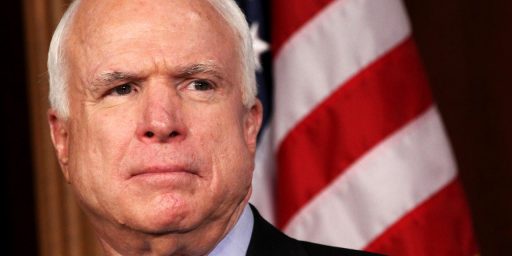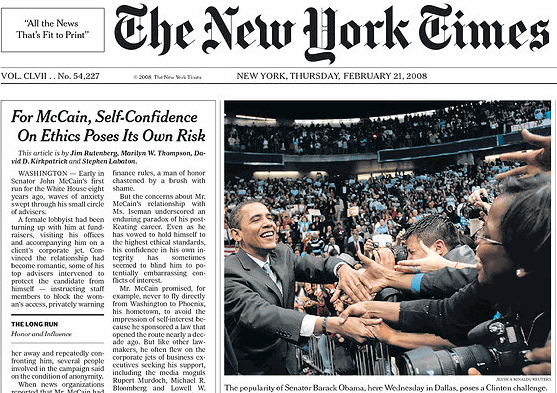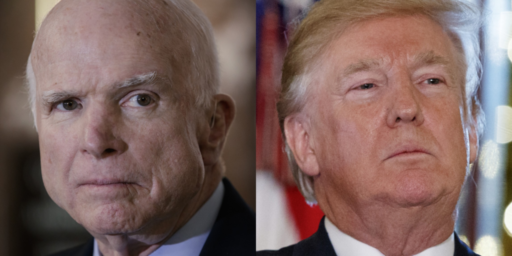Sound Byte Presidency
Kevin Drum asks the rhetorical question, “[A]re we really all so stupid that we judge participants in presidential debates by who gets off the best prepackaged zingers? I mean, we do all understand that these things are written ahead of time by staffers and then desperately plugged in by the candidates come hell or high water, regardless of whether they actually make sense in context, right?”
Back in March 2003 (a much simpler time) Steven Taylor noted that the sound bytes from President Bush’s speeches were much better than the speeches themselves (to which I helpfully noted, “Of course, they’d almost have to be. . . .”) and that it was ultimately the former, not the latter, that mattered. Why? Because only a relative handful of people actually listen to these things live and the ones who do are those most likely to have their minds made up. A much larger — and more impressionable — group of people just hear the radio and television summaries the next day.
That’s largely right. Indeed, there have been so ridiculously many of these debates that they’ve become non-events and I’ve only caught bits and pieces of a handful of them. But I’ve heard the sound bytes on NPR and elsewhere the next day and gotten a reasonable idea of the highlights. (I’ve also read transcripts, analysis, and news summaries and done quite a bit of analysis from same, so I don’t feel too bad for not having sat through them.)
So, yes, glib one-liners are important, especially in the early going.
Ronald Reagan got off a lot of zingers at the expense of President Jimmy Carter in 1980, most notably, “Are you better off now than you were four years ago?” and “There you go again.” Less cleverly but perhaps more crucially, he disarmed critics and his opponent alike in his second debate with Walter Mondale with his charming, “I will not make age an issue in this campaign. I am not going to exploit, for political purposes, my opponent’s youth and inexperience.” Were those lines written in advance by handlers? Almost certainly. But they were deftly delivered and struck a chord with the voters, encapsulating real truths in a pithy, humorous manner.
Then again, they’re not always decisive. Perhaps the most memorable debate one-liner in the last twenty-five years was Lloyd Bentsen’s zinger to Dan Quayle, “You’re no Jack Kennedy.” The line was well delivered and devastating. The Bush-Quayle ticket nonetheless recovered sufficiently to carry 40 states a month later.
UPDATE: Andrew Sullivan acknowledges that John McCain’s “Woodstock” line, at the expense of the not-present Hillary Clinton, was “a home run” and “almost perfect line for the culture war.”
Andrew laments we’re still playing out the 1960’s all these years later. I agree that it’s well past time to get over the culture wars of a bygone era.
Still, McCain’s line went beyond that and went to seriousness. He was contrasting his own sacrifice in the service of his country with his would-be opponent’s desire to spend public funds building a shrine to something so ridiculously trivial by comparison. By extension, he questions the degree to which we can trust Hillary and Obama to assign priorities. It’s a glib and yet poignant way to highlight an important contrast in both style and substance.





As long as I continue to have sound bytes on my hard drive, I’m happy. :>
You’ll see that line from McClain again at the Republican National Convention, as part of his video introduction, before he speaks as a former candidate. He’ll get another standing ovation then.